Private health clinics offer personalized care outside the traditional healthcare system. These clinics provide medical services to patients who pay directly or through private insurance. They often focus on shorter wait times and more individual attention.
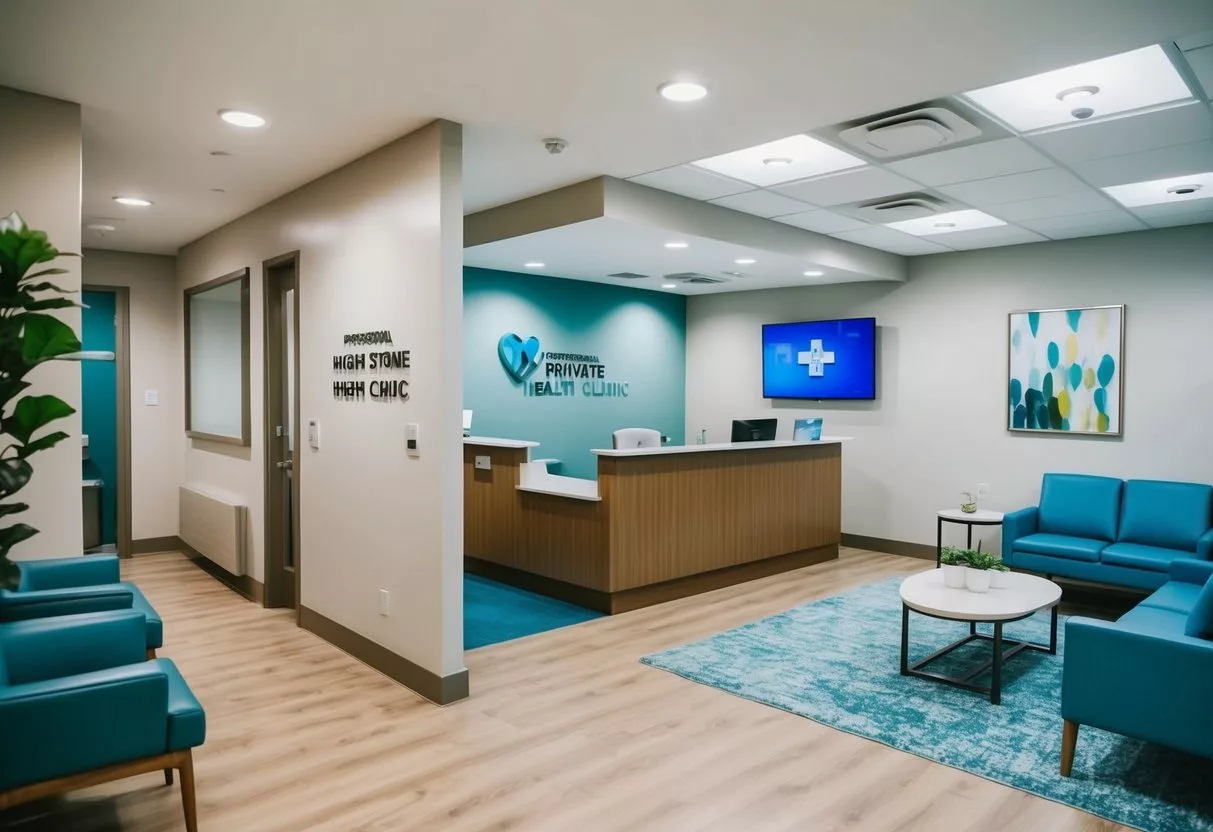
Private health clinics typically offer a range of services, from basic check-ups to specialized treatments. Some clinics cater to specific health needs, like weight loss or pain management. Others provide general primary care services.
Many private clinics offer 24/7 access to doctors[1] and longer appointment times.
Patients choose private clinics for various reasons. Some want faster access to care or more time with their doctor. Others seek treatments not covered by public health systems. Private clinics can be a good option for those who can afford the extra cost and value personalized care.
Understanding Private Health Clinics
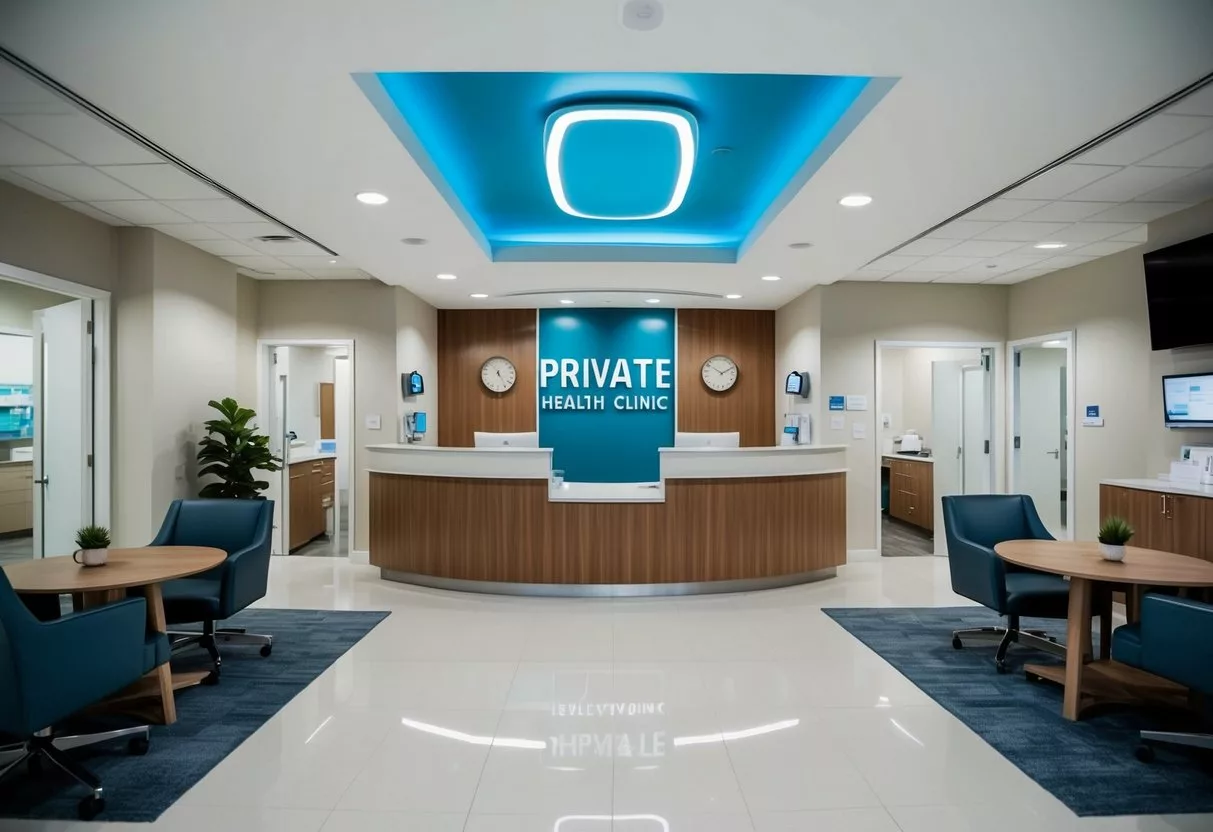
Private health clinics offer medical services outside of public healthcare systems. They come in many forms and have changed over time to meet different needs.
History and Evolution of Private Clinics
Private clinics have roots in ancient healing practices. In the 19th century, doctors began opening small offices to see patients. These grew into larger clinics in the 20th century.
Early clinics focused on general care. As medicine advanced, specialty clinics emerged. Examples include eye clinics and women’s health centers.
In recent decades, private clinics have expanded rapidly[2]. They now offer a wide range of services. Some compete with hospitals for complex procedures.
Technology has changed how clinics operate. Many use electronic records and offer telemedicine. This allows them to reach more patients.
Types of Private Health Clinics
Private clinics vary in size and focus. Here are some common types:
- General practice clinics
- Specialty clinics (e.g. cardiology, dermatology)
- Urgent care centers
- Surgical centers
- Diagnostic clinics
Some clinics are for-profit, while others are non-profit[3]. For-profit clinics aim to make money. Non-profit clinics often serve underserved groups.
Walk-in clinics offer care without appointments. They treat minor issues quickly. Membership-based clinics charge a fee for enhanced access to doctors.
Mobile clinics bring healthcare to remote areas. They often serve rural or homeless populations. Virtual clinics provide care through video calls and online platforms.
The Role of Private Health Clinics in Healthcare

Private health clinics play a vital part in modern healthcare systems. They offer a range of services from basic primary care to specialized treatments. These clinics help fill gaps in public healthcare and often provide faster access to medical care.
Comprehensive Care Services
Private health clinics provide a wide array of medical services[2]. Many offer primary care, which includes routine check-ups, vaccinations, and treatment for common illnesses. These clinics also handle preventive care, helping patients stay healthy and catch issues early.
Some private clinics have on-site labs and imaging equipment. This allows for quick diagnostic tests and results. Patients can often get blood work, X-rays, and other scans done in one place.
Many private clinics also offer mental health services. This may include counseling, therapy, and medication management. By combining physical and mental health care, these clinics provide truly comprehensive care.
Specialty Care and Referrals
Private health clinics frequently offer specialized care. This might include dermatology, cardiology, or orthopedics. Patients can see experts without long waits often found in public systems.
These clinics often have networks of specialists. If a patient needs care beyond what the clinic offers, they can get quick referrals. This helps ensure continuity of care and reduces delays in treatment.
Some private clinics focus entirely on one area of medicine. Examples include fertility clinics, pain management centers, and cosmetic surgery practices. These specialized clinics offer cutting-edge treatments in their fields.
Private clinics can also serve as a bridge to hospital care when needed. They may have partnerships with larger healthcare facilities for complex cases.
Medical Services Offered
Private health clinics provide a range of medical services to meet various patient needs. These clinics offer comprehensive care, from routine check-ups to managing long-term health issues.
Routine Physical Exams
Private clinics perform thorough physical exams to assess overall health. These exams typically include:
- Vital sign checks (blood pressure, heart rate, temperature)
- Height and weight measurements
- Vision and hearing tests
- Blood tests for cholesterol, glucose, and other key indicators
- Immunization updates
Doctors review medical history and discuss any health concerns. They may recommend preventive screenings based on age, gender, and risk factors. These can include mammograms, prostate exams, or colonoscopies.
Urgent Care for Immediate Needs
Private healthcare facilities[4] often provide urgent care services for non-life-threatening conditions. This allows patients to avoid long waits at emergency rooms. Common issues treated include:
- Minor injuries (cuts, sprains, fractures)
- Fever and flu symptoms
- Skin rashes and infections
- Ear or eye infections
- Urinary tract infections
Urgent care centers usually offer on-site X-rays and lab testing for quick diagnosis. They can also prescribe medications as needed.
Chronic Disease Management
Private clinics excel in managing ongoing health conditions. They create personalized care plans for patients with:
- Diabetes
- Hypertension
- Asthma
- Heart disease
- Arthritis
Doctors regularly monitor these conditions and adjust treatments as needed. They may use advanced diagnostic tools and collaborate with specialists. Patient education is a key focus, helping individuals understand and manage their conditions.
Clinics often provide nutrition counseling and lifestyle advice to support overall health. Some offer support groups or workshops for patients with similar conditions.
Preventive and Wellness Programs
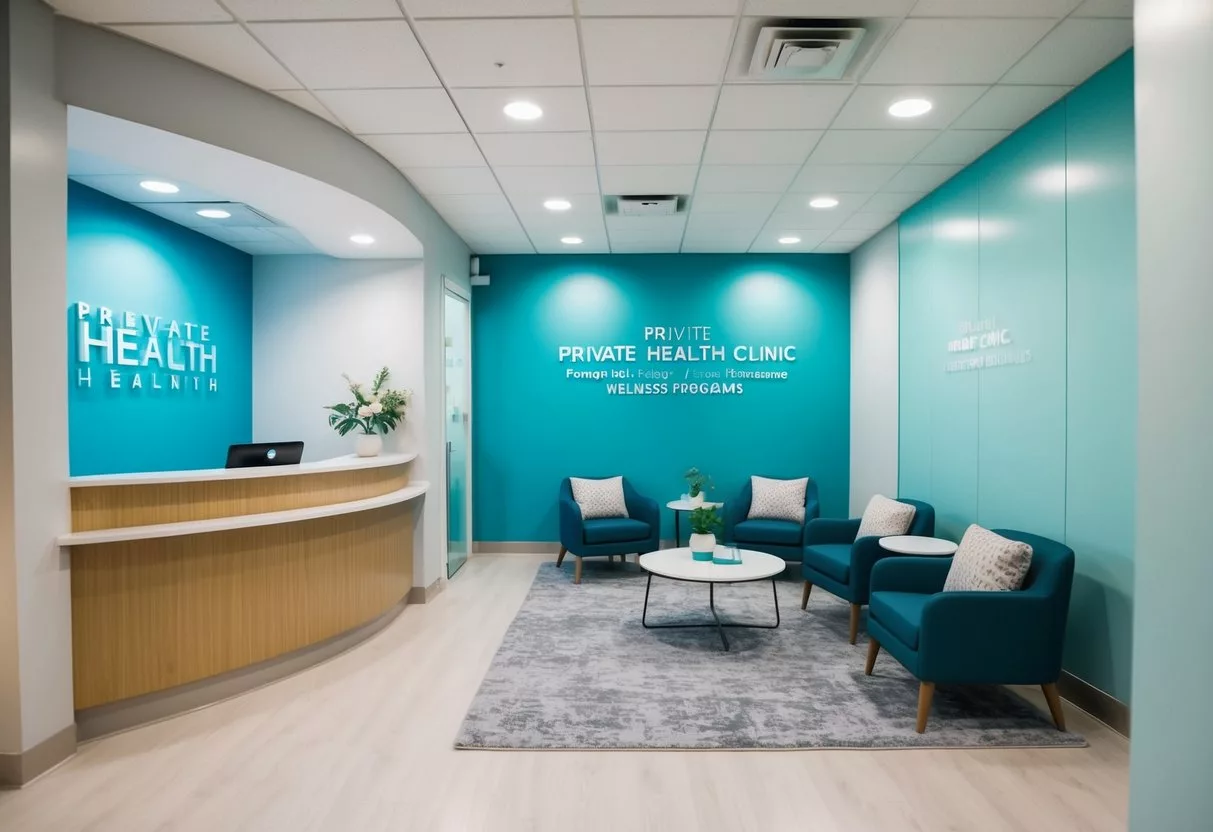
Private health clinics offer a range of preventive and wellness programs to keep patients healthy. These programs focus on early detection and disease prevention through regular check-ups and immunizations.
Health Assessments and Screenings
Health assessments are a key part of preventive care[5]. They help catch health issues early, when they’re easier to treat. Many clinics offer:
- Annual physical exams
- Blood pressure checks
- Cholesterol screenings
- Diabetes tests
- Cancer screenings
These checks can spot problems before symptoms appear. For example, mammograms can find breast cancer early. Colonoscopies can detect colon cancer.
Some clinics use advanced tools for more detailed assessments. These might include genetic tests or body composition scans. The goal is to create a full picture of a patient’s health.
Vaccination Programs
Vaccines are a vital part of preventive health services[6]. They protect against serious diseases. Private clinics often offer:
- Flu shots each year
- Childhood vaccines
- Travel vaccines
- HPV vaccines
- Shingles vaccines for older adults
Many clinics keep track of patients’ vaccine records. They send reminders when it’s time for updates. This helps ensure patients stay protected.
Some clinics run vaccination drives. These might target specific groups, like seniors or school children. The aim is to boost community health and prevent outbreaks.
Mental Health and Therapy Services
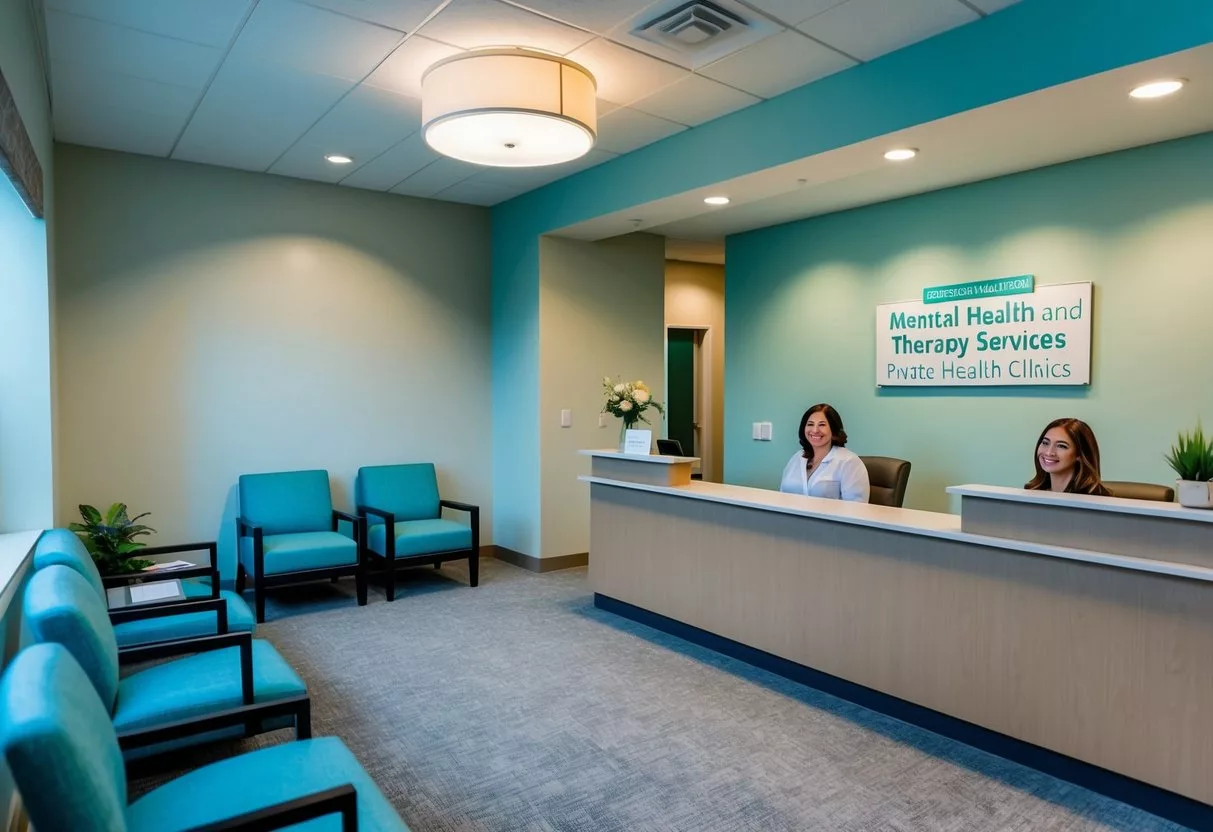
Private health clinics offer a range of mental health and therapy services. These services help people cope with mental health issues and improve their well-being.
Counseling for Common Mental Disorders
Many private clinics provide counseling for common mental disorders. Depression[7] is one of the most treated conditions. Therapists use various methods to help patients manage their symptoms.
Anxiety disorders are also frequently addressed. Cognitive-behavioral therapy is often used to treat anxiety. This approach helps patients change negative thought patterns.
Some clinics offer group therapy sessions. These can be helpful for people dealing with similar issues. Group therapy provides peer support and shared learning experiences.
Specialized Mental Health Services
Private clinics often have experts who treat more complex conditions. Bipolar disorder[8] requires specialized care. Psychiatrists may prescribe medication along with therapy to manage mood swings.
Schizophrenia treatment is another specialized service. It often involves a team approach. Psychiatrists, therapists, and social workers may all play a role in treatment.
Some clinics offer innovative therapies. These might include art therapy or music therapy. These approaches can help patients express themselves in non-verbal ways.
Crisis intervention services are also available at many clinics. These services provide immediate help for urgent mental health needs.
Physical Therapy and Rehabilitation
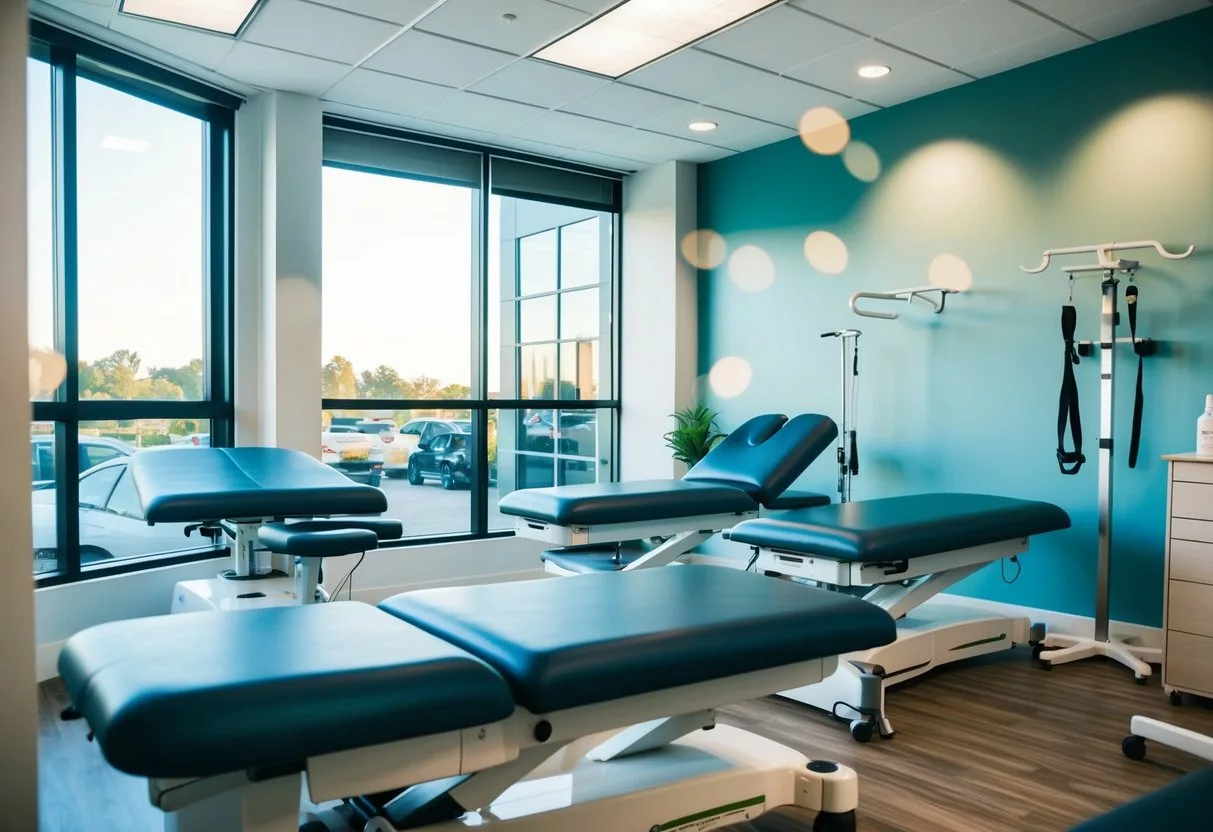
Physical therapy and rehabilitation services are key parts of private health clinics. These treatments help people recover from injuries, surgeries, and health problems. They aim to improve movement, reduce pain, and boost quality of life.
Sports Medicine and Injury Recovery
Sports medicine focuses on treating athletes and active people. It helps with injuries from sports and exercise. Physical therapists[9] use special methods to help athletes heal faster and get back to their sport.
Common treatments include:
- Strength training
- Flexibility exercises
- Balance and coordination drills
- Ice and heat therapy
These methods help with sprains, strains, and other sports injuries. They also work to prevent future injuries. Many clinics use high-tech tools like ultrasound and electrical stimulation to speed up healing.
Postoperative and Functional Rehabilitation
After surgery, rehab helps patients regain strength and function. It’s a key step in recovery for many types of operations. Outpatient physical therapy[10] often starts soon after leaving the hospital.
Rehab plans are made for each patient’s needs. They may include:
- Gentle exercises to improve range of motion
- Gait training for walking
- Activities to build strength and endurance
Therapists also teach patients how to do daily tasks safely. This helps prevent re-injury and speeds up the return to normal life. Many clinics offer both individual and group therapy sessions to support recovery.
Patient Experience and Quality of Care
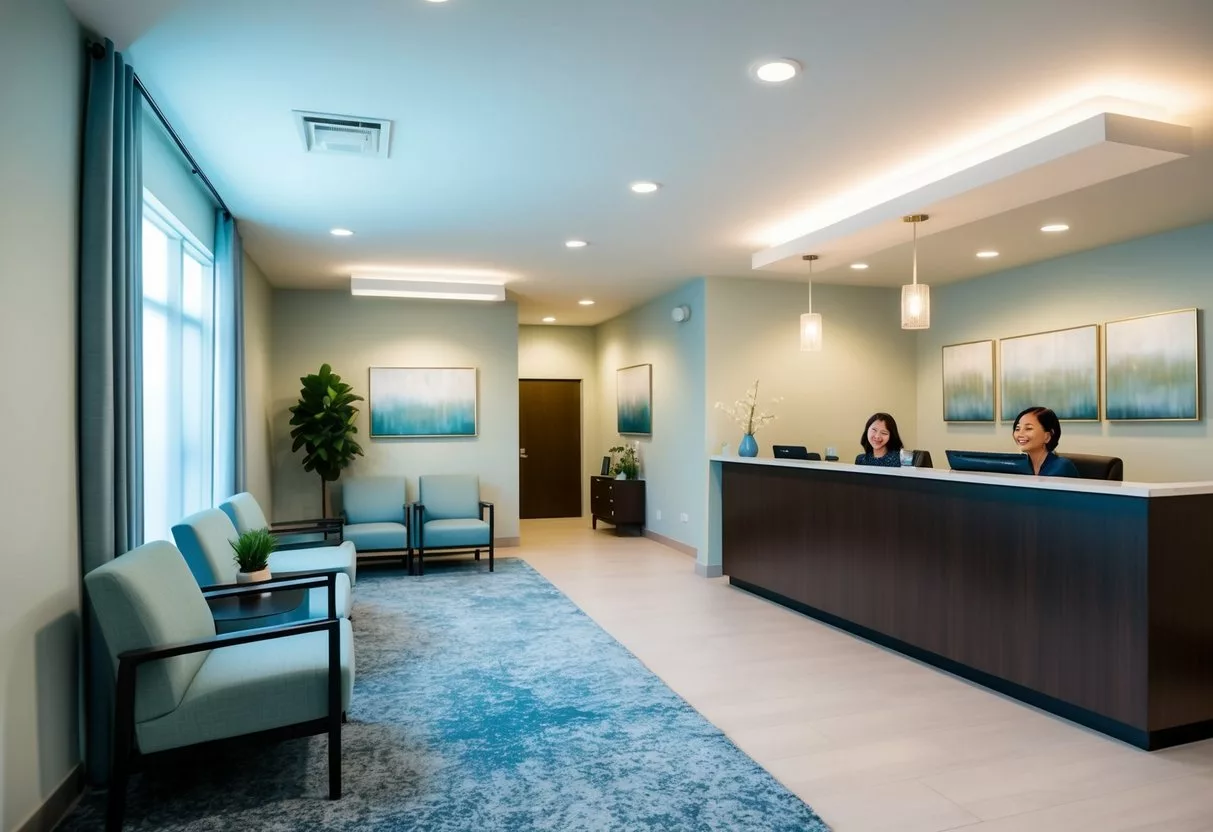
Private health clinics focus on patient satisfaction and healthcare delivery to provide top-notch care. These factors play a key role in clinic success and patient outcomes.
Evaluating Patient Satisfaction
Patient satisfaction is a crucial measure of healthcare quality. Clinics often use surveys to gauge patient views. These ask about wait times, staff friendliness, and care quality.
Patient experience[11] includes all interactions with the clinic. This covers everything from scheduling to follow-up care.
Clinics track feedback to find areas for improvement. Happy patients are more likely to follow treatment plans. They also tend to have better health outcomes. Clinics use this data to train staff and update policies.
Improving Healthcare Delivery
Quality of care is about more than just medical treatment. It includes how care is given and received.
Clinics work to make the whole process smooth and stress-free. Staff training is key to better care. This includes both medical skills and patient interaction.
Many clinics now focus on bedside manner and clear communication. Technology plays a big role[12] in improving care.
Electronic health records help track patient info. Telemedicine offers new ways to connect with doctors. Clinics also work to cut wait times and streamline appointments. This helps reduce patient stress and improves overall experience.
Insurance and Coverage Options

Private health clinics accept various insurance plans and offer different coverage options. Patients can use private insurance, Medicare Advantage, Medicare Part B, or Medicaid depending on their eligibility and the clinic’s policies.
Private Insurance and Medicare Advantage
Many private health clinics accept private insurance plans[13] like HMOs, PPOs, and EPOs. These plans often cover services at private clinics, but coverage varies.
Patients should check their policy details to understand what’s covered. Some clinics also accept Medicare Advantage plans, which are offered by private companies.
Medicare Advantage plans may provide additional benefits beyond Original Medicare. These can include coverage for services at private clinics.
Medicare Part B and Medicaid
Medicare Part B[14] typically covers outpatient care, preventive services, and medical supplies. Some private clinics accept Medicare Part B for eligible services.
Patients with Medicare Part B may need to pay a deductible and coinsurance for certain services. It’s important to confirm coverage before receiving treatment.
Medicaid coverage at private clinics varies by state and clinic. Some private clinics accept Medicaid patients, while others may not.
Medicaid typically covers a wide range of health services for low-income individuals. Patients should check with their state Medicaid office and the clinic for specific coverage details.
Cost Considerations and Financial Benefits

Private health clinics offer unique financial advantages for patients. They balance quality care with cost-effective options.
Understanding Clinic Fees and Payment Systems
Private clinics often use transparent pricing models. Patients can see costs upfront before treatment. Many clinics offer package deals for common procedures. This helps patients budget for their healthcare needs.
Some clinics use membership models. Patients pay a monthly or yearly fee for access to services. This can make routine care more affordable.
Insurance coverage varies at private clinics. Some accept standard health insurance plans. Others work on a cash-only basis. Patients should check their coverage before booking appointments.
Cost Savings and Affordable Care Options
Private clinics can offer cost savings[15] in several ways. They often have lower overhead costs than large hospitals. This can translate to lower prices for patients.
Many clinics provide preventive care services. These help catch health issues early, saving money on future treatments.
Some offer wellness programs that can reduce long-term healthcare costs.
Telemedicine options at private clinics cut travel expenses. Patients save time and money on transportation. This is especially helpful for those in rural areas.
Some clinics partner with labs and imaging centers. This can lead to discounted rates on tests and scans. Patients benefit from these partnerships through reduced out-of-pocket costs.
Notable Healthcare Facilities
Private healthcare facilities offer top-notch medical care and personalized services. Two standout clinics known for excellence are the Cleveland Clinic and Medcan Clinic.
Profile: Cleveland Clinic
The Cleveland Clinic[16] is a world-renowned medical center based in Ohio. It consistently ranks among the best hospitals in the United States.
Key features:
- 6,500 physicians and scientists
- 67,000 employees worldwide
- Over 7.6 million patient visits annually
The Cleveland Clinic excels in cardiology, cancer care, and orthopedics. It’s known for innovative treatments and cutting-edge research.
Patient care is a top priority. The clinic offers a wide range of specialties and subspecialties. Its main campus spans 170 acres and includes 50 buildings.
Profile: Medcan Clinic
Medcan Clinic is a leading private healthcare facility in Toronto, Canada. It focuses on preventive care and comprehensive health assessments.
Services offered:
- Annual health exams
- Genetic testing
- Fitness programs
- Nutrition counseling
Medcan’s approach combines medical expertise with lifestyle coaching. Patients receive personalized care plans based on their health needs.
The clinic boasts state-of-the-art technology and a team of specialists. It serves both individual clients and corporate wellness programs.
Medcan’s efficiency is notable. Most health assessments are completed in a single day.
Frequently Asked Questions
Private health clinics offer unique advantages and considerations compared to traditional healthcare settings. These clinics provide personalized care, different cost structures, and specialized services that set them apart from hospital-based care.
What are the differences between private practice and hospital-based care?
Private practices often offer more personalized attention and shorter wait times. Doctors in private clinics usually have more control over their schedules and patient loads.
Hospital-based care typically provides access to a wider range of specialists and advanced medical equipment. Hospitals are better equipped to handle complex medical emergencies.
What factors should be considered when choosing a private health clinic?
The reputation and qualifications of the doctors are crucial factors. Patients should research the clinic’s specialties and services to ensure they align with their health needs.
Location, cost, and insurance acceptance are also important considerations. Some clinics offer virtual primary care services[17], which can be convenient for routine check-ups and minor health issues.
How does the cost of Private Health Management compare to traditional healthcare?
Private health management often comes with higher upfront costs. However, it may offer more comprehensive care and preventive services that could lead to long-term savings.
Patients should carefully compare health plans[18] and consider factors like deductibles, co-pays, and coverage limits when evaluating costs.
What are the benefits of seeking care from a private health clinic?
Private clinics typically offer shorter wait times and more flexible scheduling options. Patients often receive more personalized attention and have longer appointment times with their doctors.
Many private clinics provide a wider range of services under one roof, including specialized treatments and preventive care programs.
How do private medical practices ensure the confidentiality of patient information?
Private practices must comply with HIPAA regulations to protect patient privacy. They use secure electronic health record systems and implement strict data access controls.
Staff training on privacy protocols and regular security audits help maintain patient confidentiality. Many clinics also use encrypted communication methods for patient interactions.
In what ways do private practices offer more personalized care than larger health institutions?
Doctors in private practices often have smaller patient loads, allowing them to spend more time with each patient. This can lead to more thorough examinations and detailed treatment plans.
Private clinics may offer more flexible treatment options and be more responsive to patient preferences. They can often provide continuity of care with the same doctor over time.
References
- Premier Private Physicians. https://premiermd.com/ Accessed November 3, 2025
- The private sector and universal health coverage. https://www.ncbi.nlm.nih.gov/pmc/articles/PMC6560377/ Accessed November 3, 2025
- Some clinics are for-profit, while others are non-profit. https://www.who.int/docs/default-source/health-system-governance/private-health-sector-an-operational-definition.pdf Accessed November 3, 2025
- Mayo Clinic Healthcare. https://www.mayoclinichealthcare.co.uk/ Accessed November 3, 2025
- Preventive Services Covered by Private Health Plans under the Affordable Care Act. https://www.kff.org/womens-health-policy/fact-sheet/preventive-services-covered-by-private-health-plans/ Accessed November 3, 2025
- Preventive health services. https://www.healthcare.gov/coverage/preventive-care-benefits/ Accessed November 3, 2025
- Find Therapists and Psychologists in Piscataway, NJ. https://www.psychologytoday.com/us/therapists/nj/piscataway Accessed November 3, 2025
- Community Care Behavioral Health – Behavioral Health NJ. https://communitycare.us/ Accessed November 3, 2025
- Rehabilitation and Physical Therapy. https://www.trihealth.com/services/rehabilitation-and-physical-therapy Accessed November 3, 2025
- Outpatient physical therapy. https://www.verywellhealth.com/outpatient-physical-therapy-5189470 Accessed November 3, 2025
- Understanding the Patient Experience: A Conceptual Framework. https://www.ncbi.nlm.nih.gov/pmc/articles/PMC7786717/ Accessed November 3, 2025
- 5 Principles to Improve the Patient Experience. https://hbr.org/2021/11/5-principles-to-improve-the-patient-experience Accessed November 3, 2025
- Types of Health Insurance Plans: HMO, PPO, HSA, Fee for Service, POS. https://www.webmd.com/health-insurance/types-of-health-insurance-plans Accessed November 3, 2025
- Find out what Marketplace health insurance plans cover. https://www.healthcare.gov/coverage/what-marketplace-plans-cover/ Accessed November 3, 2025
- Just a moment.... https://www.healthaffairs.org/doi/10.1377/hlthaff.2020.01560 Accessed November 3, 2025
- America's Best Hospitals: The 2025-2026 Honor Roll and Overview. https://health.usnews.com/health-care/best-hospitals/articles/best-hospitals-honor-roll-and-overview Accessed November 3, 2025
- Virtual Primary Care. https://www.wakehealth.edu/locations/clinics/v/virtual-primary-care Accessed November 3, 2025
- How to pick a health insurance plan. https://www.healthpartners.com/blog/10-questions-to-ask-when-picking-a-plan/ Accessed November 3, 2025
